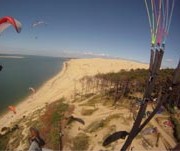Italian Language Course in Florence: A great way to learn the language and understand the history
Giles Picciotto, a Hatha yoga teacher from London, tells us about his 26-week-long language holiday in Florence, Italy, and how it has given him a greater understanding of this fascinating country’s culture, history and language.
Giles’s passion for Florence is evident, with comments like: “The world without Florence and the Renaissance isn’t possible frankly – totally unimaginable.” This, combined with wanting to do something different to your average holiday abroad, led him to choose a language holiday in Florence. Cementing his decision to study in Florence as opposed to Rome was the fact that he lives in London and did not really want to study in another large city. He had also heard from friends that Florence was slightly cheaper and if he was going to be staying there and studying for six months, this was an important factor.
When Giles landed in Italy he knew nothing of the Italian language. Starting as a complete beginner, over the course of six months his Italian language skills and vocabulary grew immensely. Throughout his course he met many interesting people of all ages and backgrounds and, although he felt that the fully immersive teaching methods were great to develop his Italian, he also felt that in cities such as Florence and Rome many people speak English, offering him fewer opportunities to practise what he had learnt in class.
Giles really liked the language school in Florence, as it was local and in a fantastic area with great teaching staff. His favourite part of the course was learning something new each day, which would stay with him long after he departed Italy. Staying in a shared student apartment, Giles enjoyed the freedom that came with it and practising his Italian with the lady who owned the apartment who came to clean it every two weeks.
Learning Italian Giles felt that he was able to understand further Italy’s rich history and culture. This, teamed with his belief that Florence is the most important and influential city of the last 1000 years, and not to mention his passion for the food and the wine – which he thinks are awesome! – meant that a language holiday in Florence was the perfect choice for Giles.
I asked Giles if he had any language tips for future students looking to study abroad and he thought some basic knowledge of the language beforehand would help, suggesting at least a vocabulary of a 1000 words and 30 phrases. For him, studying in Italy as a complete beginner and with the fully immersive method used in class, it was sometimes a struggle to process everything. He would also encourage all future students who wish to study in Florence to walk the city every day, go and see something every day, and come to understand how a city so small became so great.
Giles strongly believes that Florence is the most important city in the world and that no city except ancient Athens ever produced so much greatness at one time. Florence’s list of important people includes: Michelangelo; Dante; Boccaccio; Botticelli; Machiavelli; Leonardo and Galileo, all native to the region of Tuscany and almost all from Florence itself. He believes every one of those influential people still resonates powerfully today, many are buried within the walls of the city and there are more current inspirational people such as Gucci and Ferragamo who come from Florence that Giles can identify with.
When asked what inspired Giles most about his trip, he replied that it was just an amazing all-round experience and he was grateful to have had the opportunity to call Florence his home for 6 months, speak Italian to a good standard after his course and meet interesting people during his language holiday in Italy.
Giles is very keen to return to Italy soon and continue his studies, but first he has booked a 2-week Mandarin course in Hong Kong with Cactus. Giles is a true language enthusiast who enjoys travelling the world and learning about a country’s art, culture and history. He loves the way in which society used to work and function both intellectually and physically, believing that practising yoga and learning languages are life skills and the modern world has lost touch with that, relying too much on comfort and technology. He believes the brain must continually be challenged as well as the body.
Many thanks to Giles for taking the time to tell me about his experience and to hopefully inspiring others to do the same.
Cactus Language Training offer Italian courses in Florence and in many locations across Italy. Evening courses in Italian are also available in the UK and we also offer private language training.



